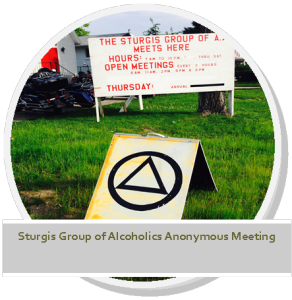My first Sturgis trip was a follow-up to the annual AA Serenity Run in Cedaredge, Colorado, in 1992. I had met a man there who was heading to Sturgis following the Serenity Run, so I asked to join him. That part was easy. But as I rode the 640 miles from Cedaredge to Sturgis, South Dakota, I started to become overwhelmed with fear and anxiety. It had been conveyed to me by my fellow AA brothers that I had to be very careful and cautious during bike week in Sturgis—it could be very dangerous. Well, after hearing those messages and having the wonderful pleasure of riding 640 miles, you can imagine what I was thinking.
After a long ride beset with fear, I arrived about 12:00 pm and landed almost on the doorstep of the Sturgis Serenity Club House on the main drag. As we all know, there are no coincidences. I immediately went in and retrieved the meeting schedule for bike week. To my surprise, meetings were held every three hours. That was my first day of my first Sturgis Motorcycle Rally.
This year marked my 22nd Sturgis Rally, and I have become very comfortable with my sober experience over the years. I have met and created many long-term sober friendships with sober riders. I discovered in the meetings at Sturgis that the bikers I was so afraid of ere just like me—garden variety drunks who had to do the same things that I do to stay sober.
Today, my wife, who is sober and rides, and I go to meetings every day and share our experience strength and hope with other alcoholics. But we also love to ride through the Black Hills, which for us is an extremely spiritual experience—which means Sturgis has become a very important part of our program, rejuvenating our spiritual connection each year.
If you’re new to AA and like to ride but are afraid to go to Sturgis, I would encourage you to take the risk. It is safe if you take your AA program with you and, if you do, I know you will have the same experience that I did. So keep the rubber down and Happy Trails!
Gordo C.


